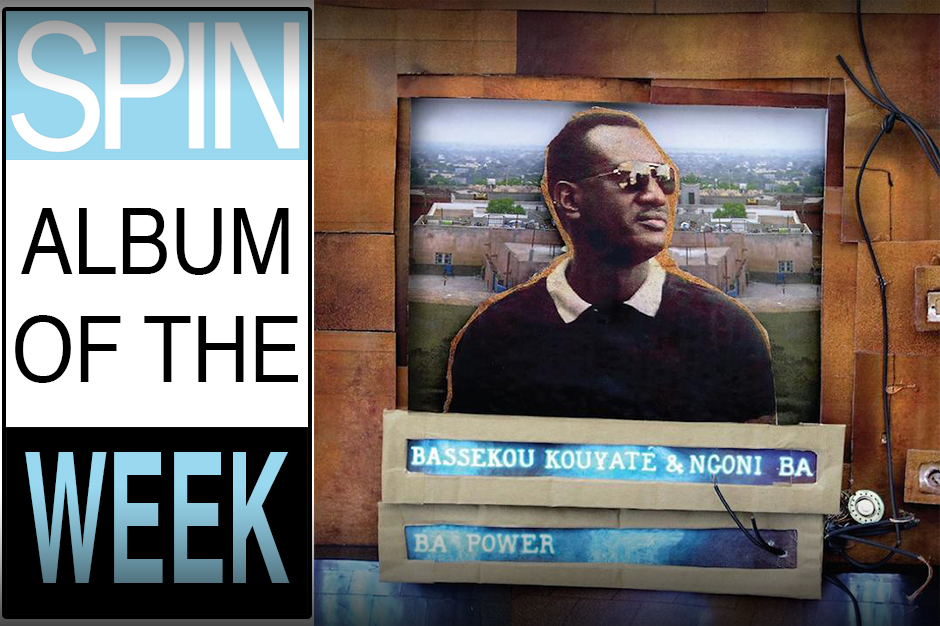Release Date: May 12, 2015
Label: Glitterbeat
Bassekou Kouyaté’s band is Ngoni Ba, which translates roughly as “The Big Ngoni,” a pretty terrific description of what Kouyaté’s selling, if you know what an “ngoni” is. “Lute” is the usual approximation, and that’s accurate insofar as the wood- or gourd-based ngoni is a Malian variant (even if the West African-derived and more percussive banjo seems a closer spiritual cousin). But Kouyaté’s ngoni collection has been retrofitted into hybridized electric instruments festooned with pickups, decked out with additional strings, and gloriously hooked through wah-wah pedals. No matter how intricate his finger-work or deep his Griot knowledge, plugged-in Kouyaté retains an admirably grimy tone, meaning lute-player or no, he belongs within the very top ranks of contemporary proponents of electric African guitar: Mauritania’s Jeiche Ould Chighali, much mourned (and fellow Malian) Lobi Traoré, Tuareg ax-wielders Bombino and Tamikrest, Sahrawi rockers Group Doueh (the latter offering a clatter so profound it makes even Kouyaté seem the essence of gentility).
While his 2013 breakout album, Jama Ko, was a noticeably harder and faster affair than either of its two immediate Ngoni Ba predecessors, Kouyaté’s new Ba Power offers an even more streamlined and forceful take on West African tradition. Jama Ko was famously recorded amid power outages in the midst of the 2012 military-helmed Malian coup, that ongoing national crisis helping cast Ngoni Ba’s spiritual resilience as de facto political statement against extremism of all kinds. While Ba Power came together under far more relaxed circumstances, over sessions on the outskirts of Bamako inside Kouyaté’s son Mamadou’s personal studio, the musical stakes still seem high.
With Kouyaté’s wife and former wedding party singer, Amy Sacko, again providing the bulk of Ngoni Ba’s rousing vocals, it’s another extended family affair, right down to fellow countryman Samba Touré’s searing guitar contributions on “Fama Magni.” But the big change is rhythmic, with Ngoni Ba’s percussion ensemble now augmented by a drum kit, helmed by Brit Dave Smith, most recently heard keeping time behind Robert Plant. Smith’s beats anchor most of these tracks, allowing Kouyaté and friends to spit out solo after solo while smaller post-production touches register in the deep background: channeled guitar, a few piano rustles, and a little trumpet from Fourth World visionary Jon Hassell.
Indeed, the blueprint for much of Ba Power is the most raucous track from Jama Ko, the galloping “Ne Me Fatigue Pas,” which is memorably punctuated by organ jabs suggestive of classic Afrobeat. Kouyaté offers an even more explicit nod towards Nigeria’s Fela Kuti this time around, with the propulsive “Waati.” Kicking off via sharp riff cuts as koras skitter around the edges and the drums blast forth, it’s a swift Afro-rock tour de force. But more idyllic sections resonate, too: The lovely “Te Duniya Laban” rivals anything off of Jama Ko, a lilting ode floating atop gentle blues/country ngoni.
Some will no doubt cluck with displeasure at the continuing Westernization of Kouyaté’s sound, as if a few indistinct guest spots and a non-Malian drummer signal the erosion of tradition in the face of almighty pop dollars. Whatever. By allowing the ngoni a leading voice while relegating the kora to supporting roles, Kouyaté’s already upended conventions, just as fellow Malaian Salif Keita did in the ’70s by incorporating Latin/Caribbean rhythms into the stage act of pioneering Afro-pop outfit Les Ambassadeurs. And the chordal progressions and song structures on Ba Power remain pure Mali — if so many of Kouyaté’s melody lines seem inherently pleasing to Western ears attuned to rock sonorities, that’s more a result of Bambara culture’s historical tendencies within the familiar pentatonic scale than any overt pandering on Ngoni Ba’s part to the demands of Stateside jam-band sonics. Bassekou’s impatience with purism of any stripe doesn’t preclude honoring the Griot tradition from whence he came. He’s simply having a grand time introducing his band to a world stage.
As perhaps a mildly defensive sop to the preceding party, Kouyaté closes out Ba Power with a short instrumental featuring unadorned acoustic ngoni. It’s pleasant, and a bit of a trifle considering all the grand noise that just bustled through. Perhaps that’s Kouyaté’s quick glance back at where he’s from, and a reminder to us all that he remains on the move.





